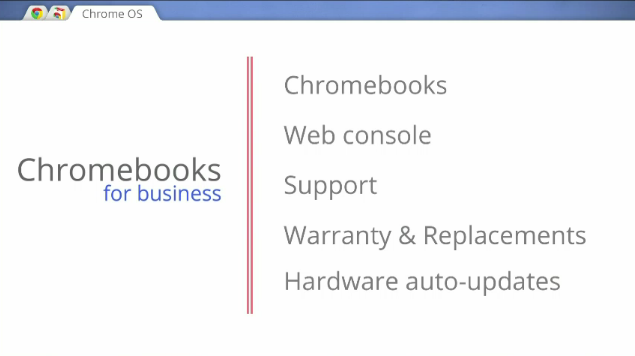Google Chromebooks: Aimed directly at Microsoft's PC upgrade cycle for $28 a month

Google on Wednesday launched an effort where Chrome OS-powered "Chromebooks" will be available for $20 a month for students and $28 for enterprises. And Google has the partnerships with enterprise heavy hitters to at least garner an evaluation.
Indeed, Google has partnered with both Citrix and VMware to ensure enterprise applications work on Chromebooks. IT admins will get a centralized console to manage all Chromebooks and remove apps. In other words, Google is putting the desktop cycle on a subscription plan---$28 a month per user.
Did Google just solve for the thin client with its Chromebook? That outcome remains to be seen, but there could be some solid business interest. Interest doesn't necessarily translate to real sales, but enterprises are likely to at least check out Google's laptop. Google argued that 75 percent of companies could use the Chromebook today.
At a press Q&A, Google's Sergey Brin said the "complexity of managing computers is really torturing users. It's a flawed model."
Acer and Samsung will make Chromebooks and carrier partnerships abound. Prices will range from $429 to $499 for Samsung and $349 and up for Acer at retail. The Chromebooks will be available June 15.
The news comes as Google is stepping up its performance gains on the Chrome browser, including speech recognition and a rapid release cycle. Developers will also get to keep 95 percent of revenue for Chrome store revenue.
Sundar Pichai. senior vice president of Chrome, touted Chromebooks' instant on, all-day battery and connected features. Pichai said Chromebooks will be updated every few weeks to make them better over time.
Meanwhile, Google Docs mail and calendar will be available offline. All games will work offline.
Pichai and other execs said:
- Chromebook's trackpad issues have been fixed.
- Intel will provide a dual-core processor.
- Cameras can be plugged in now as will USB drives.
- Music and video player is included.
- Integration with Google Apps will be seamless.
- Chrome OS APIs are designed to create a third party ecosystem with services like Box.net and Dropbox.
- 3G will be built in.
Pichai argued that enterprise apps are largely browser-based and that makes the Chromebook an option.
Other items:
- Chrome's Web store has 2x more time spent in app and 2.5 times more transactions. Google is making its Web store available in 41 languages to its 160 million users. The move is designed to give developers more reach and monetization efforts. One line of code can enable payments. Developers will pay a flat fee of 5 percent with them keeping 95 percent of revenue.
- For good measure, the Chrome Web Store is getting Angry Birds, which will boost interest in the marketplace.
- Google demonstrated speech support within Chrome. Translation from English to Chinese was demonstrated. Speech recognition is increasingly Google's best feature across Android and its applications.
- Another Chrome demonstration focused on GPU integration and WebGL with the fishtank example. The message revolved around increased performance enhancements, including 3D animation.
